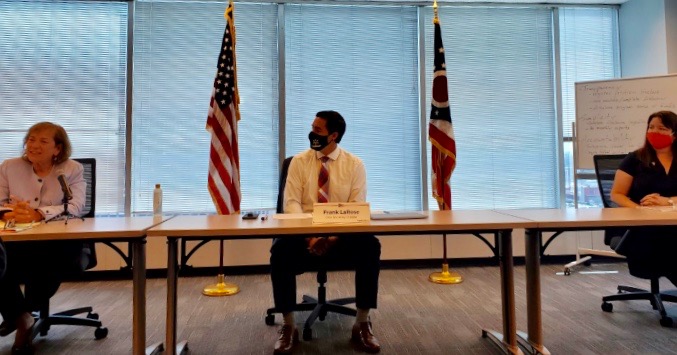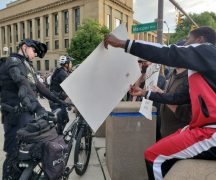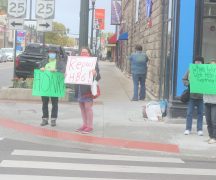If you can follow the money, state Rep. Gayle Manning reasons, you can follow what’s going on.
That’s the main drive behind a new bill proposed by Manning, R-North Ridgeville, and Rep. Jessica Miranda, D-Forest Park, which seeks to reform Ohio’s campaign finance landscape through shining light on anonymous political spending.
Their House Bill 737 was introduced shortly after the July 21 arrest of Ohio House Speaker Larry Householder, R-Glenford, as part of a federal bribery investigation. Ohio Secretary of State Frank LaRose, whose office oversees campaign finance reporting, has come out in favor of the bill. Fifteen other state legislators of both parties have signed on as cosponsors.
LaRose met with Manning and Miranda on Monday morning to discuss legislative ideas, then the trio outlined proposals to reporters.
Householder and four others were arrested as part of a $61 million racketeering scheme to enact a $1.3 billion nuclear bailout in the form of House Bill 6. The 2019 bill was meant to benefit the former FirstEnergy Solutions of Akron, while also allegedly personally enriching Householder and other political operatives in the process.
The scheme, as alleged by federal investigators, centered on use of “dark money groups” registered as 501(c)(4) organizations. While political candidates are required to disclose their donations and spending through regular campaign finance reports, these nonprofit “social welfare” groups do not have to under federal law.
Investigators say FirstEnergy funneled millions of dollars to the groups, which in turn used the money to support Householder, his allies and the effort to pass HB 6. David M. DeVillers, the U.S. Attorney for the Southern District of Ohio, has said the conspiracy likely could not have happened without perpetrators having taken advantage of campaign finance rules exempting dark money groups from having to disclose their donors.
The new bill proposed by Manning and Miranda would not place any new restrictions on political spending for elections or other policy issues. It would, however, require all spending going forward to be publicly disclosed.
Using HB 6 as an example, FirstEnergy would still have been allowed to spend millions to influence the outcome of the bill. However, this spending would have been made public at the time, a fact that may have impacted its support among lawmakers in the Ohio Statehouse as well as their constituents.
“If you’re going to spend your money, you should own it,” LaRose said.

is a supporter of HB 737
to reform Ohio’s
campaign finance laws.
Besides the transparency component, the bill’s proponents want to reform Ohio’s campaign laws in a few other ways.
One aspect involves “petition blockers.” As part of the Householder scheme, his alleged criminal enterprise worked to scuttle a referendum effort to get HB 6 overturned. Such people working to impede a petition drive should have to register themselves and identify who is paying them, LaRose and the HB 737 sponsors say.
The bill would also provide new subpoena powers to the Ohio Secretary of State’s Office in investigating campaign finance issues.
Manning said the new Speaker of the House Bob Cupp, R-Lima, has expressed initial support for the bill. Manning’s son, state Sen. Nathan Manning, R-North Ridgeville, has introduced similar legislation in the Ohio Senate.
Supporters of this legislation say they hope the pressure stemming from the fallout of Householder’s arrest will lead Ohio lawmakers to getting these reforms passed.
“This is the time,” Miranda said.
***
Voting rights groups recommends health safety measures for election
The Ohio Voting Rights Coalition urged state leaders on Monday to adopt its recommendations for safe in-person voting procedures leading up to the November election amid the coronavirus pandemic.
In a letter to Secretary of State Frank LaRose, the group outlined six key measures endorsed by over 250 public health officials, voting rights and allied organizations, and faith leaders to slow the spread of COVID-19 at polling places. The recommendations include social distancing and mask mandates, special protections for those at high-risk for contracting the virus, frequent hand washing, personal protective equipment for poll workers, and proper ventilation for indoor polling places.
“We really need to have a safe and consistent protocol throughout the 88 counties of Ohio for in-person voting,” Alice Frazier, a retired family practitioner and Ohio poll worker, said at a virtual press conference. “You have to assume that everyone either is carrying the virus or could catch the virus, and that includes our poll workers and our voters.” READ MORE
Records: Ohio Medicaid leaders showed little enthusiasm to support coronavirus testing at pharmacies
The Ohio Department of Medicaid is struggling to implement a system to reimburse community pharmacists to test millions of the state’s poorest people for coronavirus.
While the reasons for the problems have not been fully explained, difficulty getting supplies appears to be one.
But another cause might be that at least into June, senior leaders at the agency appear to have communicated little about creating a plan. And many of the emails they did send seemed to resist doing so, according to records obtained by the Capital Journal.
In one instance, a Medicaid official even asked about creating a strategy to deny payment to pharmacies. He raised that possibility on May 11 — more than a month before the Medicaid department had even established a reimbursement rate. READ MORE
House Dem lawmakers seek rainy day funds for eviction protections
The coronavirus pandemic’s effect on the local economy continues, and two state representatives are trying to tap into the state’s rainy day fund for an “eviction crisis response.”
In a bill introduced on Monday, $270 million would be used for immediate, one-time rent relief, according to the sponsors, state Rep. David Leland, D-Columbus; and state Rep. Juanita Brent, D-Cleveland.
Helping Ohioans stay on their feet amid significant business closures and cuts, job losses and statewide economic losses is something with which the state should be charged, Leland said.
“When you think of what eviction does to a person, it wrecks their credit, and it puts them out on the street, when we’re all supposed to be staying home,” Leland told the Capital Journal. READ MORE





